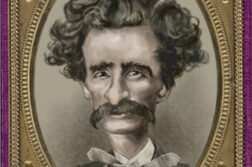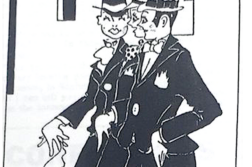BENJAMIN BRITTEN’S OPERA Billy Budd is based on a famous, sexually ambiguous novella by Herman Melville (written in 1891 but not published until 1924). The opera focuses on the angelically beautiful young innocent who could have been saved, but whose stammer prevents him from speaking when he’s falsely accused and is destroyed by evil powers. Britten and his librettists accentuated the homosexual themes that are hinted at in the novella. The opera portrays in verbal, visual, and musical terms how the adult characters struggle with their fierce and destructive desires. The conflict between good and evil represents the repressed and disguised love that dare not speak its name.
This opera was created in a homosexual milieu. E. M. Forster, the librettist of Billy Budd, was a repressed homosexual. Britten, the composer, and Peter Pears, the leading singer, were long-time lovers. Britten was also in love with the handsome young David Hemmings, who played Billy Budd, and with the attractive young Ronan Magill, who took the role of Tadzio in Britten’s opera Death in Venice. But he restrained himself and did not seduce the boys. David Hemmings recalled: “He was incredibly warm to me, yes. Was he infatuated with me? Yes, he was. He was a gentleman; there was no sort of overt sexuality about it whatsoever” (Carpenter, 1992).
Billy Budd, an unusual subject for an opera, has an inarticulate hero, an elusive narrator, and an all-male cast in the claustrophobic setting of a ship. The story is simple: on a Royal Navy vessel, during the war with revolutionary France in 1797, John Claggart, the Master-at-Arms who’s responsible for discipline on board, is a brutal sadist who resents the youth and innocence of Billy Budd. He accuses Billy of fomenting a mutiny. Billy strikes and kills him, and Captain Vere allows him to be sentenced to death. The cruel officers are very different from Jane Austen’s idealized naval heroes. The harsh conditions justify Samuel Johnson’s observation that “being in a ship is being in a jail with the chance of being drowned.” They also support Winston Churchill’s succinct statement that “the traditions of the Royal Navy are rum, sodomy, and the lash.”








